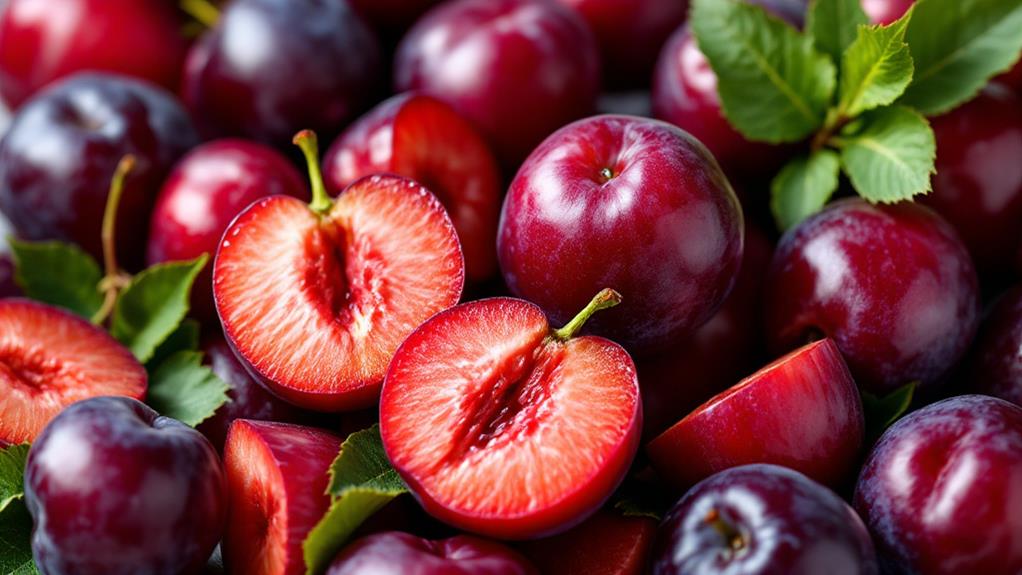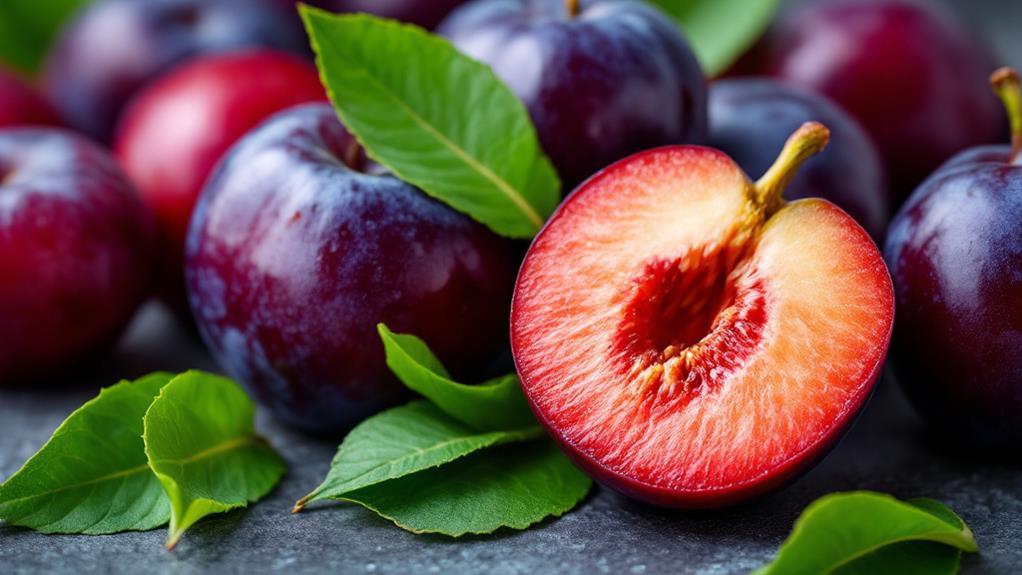A Comprehensive Guide to Plums and Their Health Benefits

Plums, with over 2,000 varieties, are more than just a tasty fruit; they're a powerhouse of nutrients and health benefits. Eating plums helps regulate blood sugar levels, thanks to their low glycemic index. They're packed with vitamins A, C, and K, enhancing your immune system and supporting bone health. Plums are fiber-rich, easing digestion, and contain antioxidants that protect against oxidative stress and chronic diseases. Their high potassium content aids heart health and can help manage blood pressure. For those interested in plums' full spectrum of health advantages and culinary uses, there's much more to investigate.
Understanding Plums
While you might not think much about plums as you pass them in the fruit aisle, these small stone fruits are a fascinating study in diversity and nutrition. With over 2,000 varieties originating from China, plums offer a colorful array of options, from green to purple. Their peak season is May to October, with the juiciest ones typically found in July and August.
Plums, regardless of being fresh or dried as prunes, provide numerous health benefits. They are packed with vitamins and minerals that support general well-being. The low glycemic index of plums makes them a smart choice for maintaining stable blood sugar levels. In terms of digestive health, prunes are particularly renowned for their ability to aid in regularity, thanks to their high fiber content.
Besides promoting digestive health, plums are rich in antioxidants, which play a vital role in protecting your cells from damage. These antioxidants also contribute to bone health, making them an excellent supplement to your diet. Regardless of whether you enjoy them fresh or dried, the health benefits of plums are significant. So, next time you're in the fruit aisle, consider incorporating this versatile fruit into your basket.
Nutritional Profile
A nutritional powerhouse, plums are a fantastic supplement to your diet. Each fruit contains approximately 30 calories, making them a perfect low-calorie snack. Despite their modest size, plums pack a punch regarding nutrition. You'll find about 7.54 grams of carbohydrates, 0.9 grams of fiber, and 0.46 grams of protein per plum, giving you a quick, satisfying enhancement.
Plums boast an impressive nutritional profile, offering 10% of the Recommended Dietary Intake (RDI) for Vitamin C, which plays a vital role in supporting your immune system. They also provide 5% of the RDI for Vitamin A and Vitamin K, which are fundamental for bone health and other bodily functions. Packed with approximately 103.62 mg of potassium, plums are excellent for fluid regulation and maintaining heart health.
The dietary fiber in plums, especially in dried prunes, supports digestive health and promotes regularity. Additionally, plums are rich in antioxidants, including phenolic compounds, which help combat oxidative stress and inflammation. By incorporating plums into your diet, you're not only enjoying a tasty treat but also nourishing your body with key nutrients that contribute to overall wellness.
Health Advantages

Understanding the nutritional profile of plums highlights their potential health advantages. Plums are packed with vitamins A, C, and K, which are fundamental for enhancing your immune function, maintaining good vision, and supporting bone health. The high fiber content in plums helps aid digestion, ensuring regular bowel movements. If you're dealing with constipation, the sorbitol in dried plums, or prunes, acts as an effective natural laxative.
Incorporating plums into your diet can support cardiovascular health. They contain phytochemicals that may help lower blood pressure and cholesterol levels, vital factors in maintaining a healthy heart. Regular consumption of plums is linked to a reduced risk of chronic diseases like heart disease and type 2 diabetes. This is due to their low glycemic index and rich antioxidant properties, which help protect your body against oxidative stress.
Moreover, plums may contribute greatly to bone health. Studies suggest that prunes can improve bone density and reduce the risk of osteoporosis, especially in postmenopausal women. By including plums in your daily diet, you can make meaningful strides in promoting general health and well-being.
Benefits for Chronic Conditions
Plums shine as a powerful ally in managing chronic conditions. If you're dealing with type 2 diabetes, plums' low glycemic index can help keep your blood sugar levels stable. This means you can enjoy their sweet taste without worrying about sudden spikes. Furthermore, the high potassium content in plums plays a significant role in regulating blood pressure. By keeping your blood pressure in check, you reduce your risk of stroke and bolster your heart's health.
Antioxidants are another vital component in plums, working hard to combat oxidative stress and inflammation. These properties may lower the risk of certain cancers, like colon cancer, while also contributing to the prevention of heart disease. This makes plums a heart-friendly choice for anyone concerned about cardiovascular wellness.
In addition, plums support your digestive health. Their natural sorbitol content acts as a gentle laxative, helping to alleviate constipation and keep your digestive system running smoothly. Plus, the anti-inflammatory phytochemicals found in plums add another layer of protection against heart disease and other chronic conditions. By incorporating plums into your diet, you're taking a flavorful step toward better health and chronic condition management.
Functional Food Properties

Engross yourself in the world of functional foods, and you'll find plums standing out with their impressive health benefits. These fruits are packed with antioxidants that play a vital role in maintaining your health. Kakadu plums, for example, boast vitamin C levels more than 100 times that of oranges, making them a powerhouse in enhancing your immune system and fighting oxidative stress. This antioxidant richness not only supports general health but also aids in the prevention of chronic diseases.
Plums, including prunes, are loaded with fiber, which is fundamental for digestive health. If you struggle with constipation, incorporating prunes into your diet can offer relief due to their high fiber and sorbitol content. The phytochemicals present in plums further amplify their status as functional foods, contributing to cardiovascular health and reducing the risk of chronic diseases.
Java plums have shown promise in combating cancer cell proliferation, thanks to their natural antioxidant potential. Additionally, Kakadu plums exhibit antibacterial properties, highlighting their role in food safety. By including plums in your diet, you're not only savoring a delicious fruit but also embracing a spectrum of health benefits that strengthen your comprehensive well-being.
Culinary Uses
Exploring the culinary uses of plums reveals their versatility and delightful flavor profile. You can enjoy plums fresh or dried, and they seamlessly improve both sweet and savory dishes. Fresh plums are perfect for making smoothies, fruit salsas, or infusing water, offering hydration and a rejuvenating taste. They're also ideal for seasonal recipes, especially from July to August when they're at their peak quality. When selecting, choose firm fruits with a slight give, and store them in the fridge to maintain their freshness.
Dried plums, or prunes, bring a rich, sweet flavor to the table, making them excellent in baking or as natural sweeteners. Incorporating prunes into your culinary creations can add depth to desserts or even savory dishes. They're a great option when you want to replace refined sugars with a more wholesome alternative.
Here are some creative ways to use plums in your kitchen:
- Smoothies: Add fresh plums for a burst of flavor and hydration.
- Baking: Use prunes for moist, rich cakes or bread.
- Infused Water: Slice fresh plums for a naturally sweet beverage.
- Seasonal Salads: Combine fresh plums with greens and nuts for a lively dish.
Digestive Health Support

If you're looking for a natural way to support your digestive health, consider incorporating plums into your diet. Plums are rich in dietary fiber, providing about 1 gram of fiber per plum. This fiber plays an essential role in promoting digestive health and ensuring regular bowel movements. By including plums in your meals, you can help maintain bowel regularity and improve general gastrointestinal health.
Dried plums, or prunes, are especially beneficial for constipation relief. They contain high levels of sorbitol, a natural laxative that can be more effective than traditional options like psyllium. Consuming prunes regularly can boost your digestive function considerably. If you're dealing with constipation, try eating 1/4 to 1/2 cup of prunes or drinking 4-8 ounces of prune juice daily for best results.
Beyond just easing constipation, plums and prunes also improve nutrient absorption. This means your body can make the most of the nutrients you consume, leading to better general health. By incorporating these fruits into your diet, you're not just supporting your digestive system but also contributing to your body's nutrient intake and general well-being.
Bone Health
While plums are great for digestive health, they also offer remarkable benefits for bone health. Prunes, the dried version of plums, have been shown to considerably improve bone density and reduce bone loss, especially in postmenopausal women. Daily consumption of prunes can lead to notable improvements in bone health. A 2020 study even revealed that men eating prunes daily experienced less bone loss, showcasing the protective effects against osteoporosis.
The nutrient-rich composition of prunes—packed with vitamins K, phosphorus, magnesium, and potassium—plays a vital role in supporting bone health. These nutrients help prevent mineral deficiencies, which can weaken bones. Additionally, the polyphenols and antioxidants in prunes may help reduce oxidative stress and inflammation, both linked to deterioration in bone health.
Incorporating prunes into your daily diet can lead to increased bone formation and decreased bone resorption, making them an effective dietary choice for maintaining bone strength. Consider these benefits:
- Bone Density Improvement: Prunes help boost bone density, reducing the risk of fractures.
- Osteoporosis Prevention: Regular prune intake offers protective effects against osteoporosis.
- Nutrient Support: Prunes supply vital vitamins and minerals for bone health.
- Anti-inflammatory Effects: Antioxidants and polyphenols in prunes fight inflammation.
Safety and Considerations

When incorporating plums into your diet, it is vital to take into account a few safety aspects to guarantee you're reaping the benefits without any adverse effects. Initially, remove the plum stones before consumption to prevent choking hazards or potential esophageal injury. Although chewing or crushing these stones can release amygdalin, which may convert to cyanide, the risk from small amounts is generally low. However, it is best to avoid it altogether.
For those with diabetes, monitor your plum and prune intake due to their natural sugar content. Consuming them in moderation is important to avoid significant blood sugar spikes. Moreover, excessive consumption, especially of dried prunes, can lead to gastrointestinal discomfort, including diarrhea or laxative effects, due to their high fiber and sorbitol content.
Though allergic reactions to plums are rare, if you have sensitivities, be cautious. A consultation with a healthcare provider is advised, especially if you're on medications that might interact with plums. By being mindful of these factors, you can enjoy the health benefits of plums while minimizing any potential risks. Always prioritize moderation and awareness in your consumption habits.




